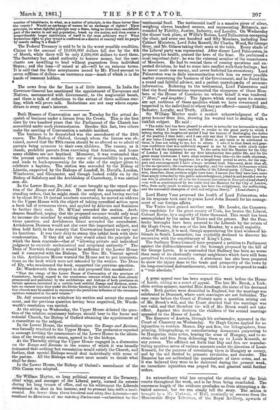Sir William Hayter, so long political secretary at the Treasury,
chief whip, and manager of the Liberal party, earned its esteem during his 'long tenure of office, and on his retirement the Liberals determined to dine in his honour', and to present him with a .testi- .No :fewer than three hundred and sixty-live Liberals—not confined to :Members of the existiug iihnlianient—suhsaribed .to !the
testimonial fund. The testimonial itself is a massive piece of silver, weighing eleven hundred ounces, and representing Britannia, sur- rounded by Fidelity, Justice, Industry, and Loyalty. On Wednesday the dinner took place, at Willis's Rooms, Lord Palmerston occupying the chair, and some one hundred and Iffy Members, including four Cabinet Ministers, Lord John Russell,-.Sir Charles Wood, Sir George Grey, and Mr. Gibson taking their seats at the table. Every shade of the Liberal party was represented. After dinner Lord Palmerston, in proposing-his health, praised the hero of the -feast. He performed a most important duty: he was the external monitor of the consciences of Members. He had to remind them of coming questions and ex- pected divisions, he had to come into conflict with theirfeelings; but he never made one enemy, and never forfeited his consistency. Lord Pabnerston-was in daily communication with him on every possible matter concerning the business of the Government, and he found-him a sound and faithful adviser, and a perfect encyclopaedia of accurate information. Referring -to the testimonial, Lord Palmerston said that the floral decorations represented the eloquence of 'those Mem- bers of the House of Commons on -whose behalf it was tendered. (" Hear," and 1aughter.) The figures which stand upon its summit are apt emblems of those qualities which we have reverenced and respected in the individual to whom they are offered—namely Fidelity, Industry, Loyalty, and Truth. (Cheers.)
Sir William Ilayter made a modest acknowledgment of the great honour done him, showing his wonted tact in dealing with a ticklish subject. He said :
"The noble lord has been pleased to advert in terms far too favourable to those services which I have been enabled to render to the great party to which I belong during the lengthened period I had the honour of discharging the duties of the position I then held; and I can only say that if those services have been of any value I heartily rejoice at it. If there is any merit to be attributed to them, it does not belong to me, but to others. I owe it to that frank and gene- rous confidence that was uniformly reposed in me by those noble chiefs under whom I had the happiness to serve. To the noble lord the Member for the City of London I am indebted for my first introduction into public life, and for the great many kindnesses I have since received from him—to the noble chairman, under whom it was my happiness for a lengthened period to serve, for the sup- port and encouragement I have always received from him--and, more than all, -to the ce-operation, the courteous sympathy, and the unselfish forbearance which have always met with from every member of the Liberal party. (Cheers.) What- ever, therefore, these services might have been I assure you they have been more than amply rewarded by this public acknowledgment, joined in and presided over by one who is admitted by all to be the foremost statesman in Europe—(If:tad chasm) —as well as countenanced by the noble lord the Member for the City of London, who, -from early youth to mature age, has been the enlightened, the unflinching, and the successful champion of civil and religious liberty." (Loud cheers.)
Lord Harry Vane proposed the health of lord Palmerston, who in his response took care to praise Lord John Russell for his manage- ment of our foreign affairs. The Tories have gained another seat. Mr. Leader, the Conserva- tive candidate for the great county of Cork, has beaten the Liberal, Colonel Roche, by a majority of three thousand. This result has been accomplished by the union of Tories and the priests. But the Pem- broke -boroughs have been secured to the Liberals by the return of Sir Hugh Owen, the son of the late Member, by a small majority.. Lord Stanley, it is-said, though appreciating the kind wishes of his friends in South Lancashire, has explicitly declined to dissever his connexion with the constituency of King's Lynn.
The Sudbury Town Council have prepared a petition to Parliament against the disfranchisement of the borough proposed by the bill of -Sir George Lewis. It is contended that Sudbury has been no worse than many of its electorally corrupt neighbours which have still been permitted to return members. A statement has also been prepared to show the injury done to the =trade and prosperity of the town by its long-continued disfranchisement, which it is now proposed to make a "rule absolute."






























 Previous page
Previous page